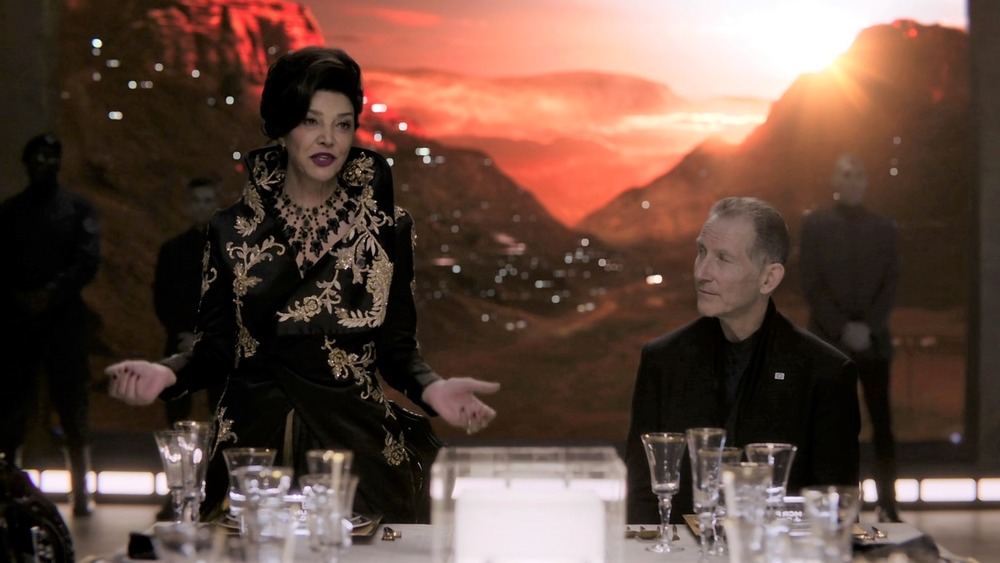The Martian Color Detail That Has The Expanse Fans Scratching Their Heads
Few science fiction shows around today do worldbuilding quite as well as Amazon Prime Video's The Expanse. Set several hundred years in the future, the series imagines a future in which humanity has spread across the solar system. Beyond loading viewers up with the particulars of the tech used to colonize planets and moons (and some great Easter eggs), the series also takes great pains to establish the political and societal norms of the fresh civilizations that have sprung up during this new age of human expansion.
In the world of The Expanse, humanity is hundreds of years into this project of dispersing across the known universe, and those born in colonies away from Earth no longer identify themselves as Earthers. Take, for instance, the planet Mars. In the time since it was first colonized, a unique culture and identity has emerged among the Martians, which eventually led them to breaking ties with the planet of their origin altogether and forming their own government. While a couple hundred years may not seem like a long enough for humans to earnestly identify as inhabitants of an entirely new planet, keep in mind that we're well under three centuries into the existence of the United States of America.
The Expanse goes to great lengths to show just how different Martians are to Earthers, Belters, and every other culture that has emerged across the solar system. Some of these differences are big ticket items, like the way their governments or economies work, while others are much more subtle. Fans of the series recently took to Reddit to discuss one small detail about Martian culture that initially threw them for a loop.
The color red has a different meaning to Martians
Reddit user IAmA_Opisthokont_AMA started a Reddit thread titled "Small cultural detail: Martian treatment of the color red" to discuss an interesting way the planet's cultural association with the color has diverged from Earth's. While the color red has a plethora of associations throughout the world, in modern times, it has come to be broadly associated with danger, the need for alertness, something that has been removed or canceled. However, as u/IAmA_Opisthokont_AMA points out, those who live on the Red Planet seem to have turned the tables on those correlations.
Take, for instance, a scene in which we see a person's name being removed from a list on a hologram device, at which point it changes from red to blue. As u/IAmA_Opisthokont_AMA explained, "Earthers use red in that context to mean dead/inactive and blue to mean alive/active. It seems that in Martian culture, they have the color roles flipped, maybe owing to their affinity for the color red."
Other fans of The Expanse thought they were spot on in their analysis. User Chutney_Chiller responded, "Good catch. It's 100% deliberate. It was established in Season 01 that Red was a primary colour for Martian tech... We've been conditioned to think 'red = stop/bad' but for Martian design, Red and oranges are always used as primary colours... I loved the idea that even in their design language, they were still combating Earth."
Although it seems like a superficial and even petty thing at first, considering how ancient and symbolic the color red is to Mars, it's actually quite fitting.
The association that links the Martians of the Expanse to ancient civilizations on Earth
Mars got the nickname "the Red Planet" because, well, it's a red planet. The iron oxide in Mars' soil gives it that deep, rust coloring with which it has become synonymous (via NASA). And although we've only recently gotten a closer look at it thanks to our own space exploration and robot-assisted trips to the planet's surface, humans have been able to see the red dirt of Mars for thousands of years. In fact, there's even a clever connection between how Martian society has developed in the world of The Expanse and the perception of the planet in the ancient world.
In The Expanse, Mars is a society known for its ongoing terraforming mission, its advanced technology, and its military might. That is fitting, considering the planet has been associated with warfare since ancient times. Babylonian astrologers saw a connection between the planet and Nergal, which was also the name of their god of war and destruction. The Greeks and Romans continued this tradition. To the Greeks, the planet was associated with Ares, who was similarly their god of war, and it was the Romans who linked it to Mars, who succeeded Ares. Presumably, these associations were culled from the planet's red, bloody appearance in the sky (via Dictionary).
Whether the Martians of The Expanse are embracing the color red as part of an ancient warlike tradition, or simply using it as a convenient way to differentiate themselves from their Earther adversaries, the way the series incorporates the color into their culture is as subtle as it is clever.


